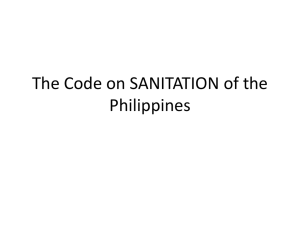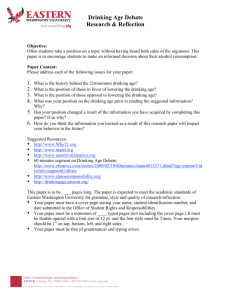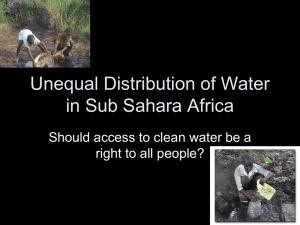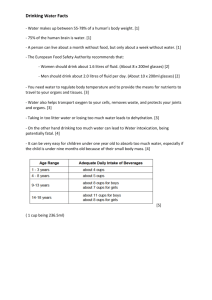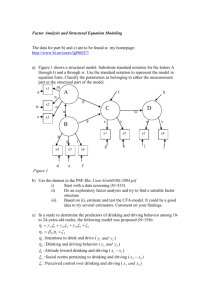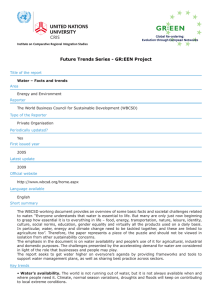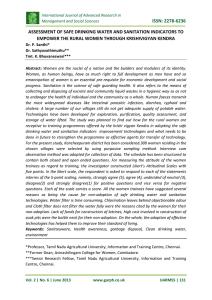Water - WordPress.com
advertisement
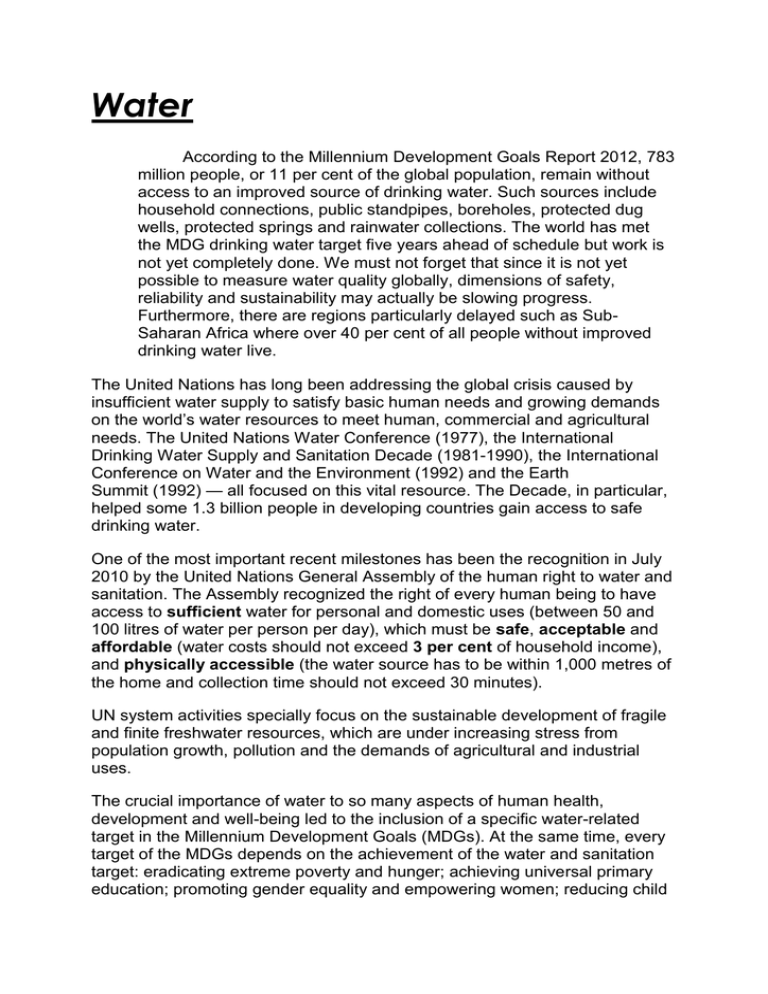
Water According to the Millennium Development Goals Report 2012, 783 million people, or 11 per cent of the global population, remain without access to an improved source of drinking water. Such sources include household connections, public standpipes, boreholes, protected dug wells, protected springs and rainwater collections. The world has met the MDG drinking water target five years ahead of schedule but work is not yet completely done. We must not forget that since it is not yet possible to measure water quality globally, dimensions of safety, reliability and sustainability may actually be slowing progress. Furthermore, there are regions particularly delayed such as SubSaharan Africa where over 40 per cent of all people without improved drinking water live. The United Nations has long been addressing the global crisis caused by insufficient water supply to satisfy basic human needs and growing demands on the world’s water resources to meet human, commercial and agricultural needs. The United Nations Water Conference (1977), the International Drinking Water Supply and Sanitation Decade (1981-1990), the International Conference on Water and the Environment (1992) and the Earth Summit (1992) — all focused on this vital resource. The Decade, in particular, helped some 1.3 billion people in developing countries gain access to safe drinking water. One of the most important recent milestones has been the recognition in July 2010 by the United Nations General Assembly of the human right to water and sanitation. The Assembly recognized the right of every human being to have access to sufficient water for personal and domestic uses (between 50 and 100 litres of water per person per day), which must be safe, acceptable and affordable (water costs should not exceed 3 per cent of household income), and physically accessible (the water source has to be within 1,000 metres of the home and collection time should not exceed 30 minutes). UN system activities specially focus on the sustainable development of fragile and finite freshwater resources, which are under increasing stress from population growth, pollution and the demands of agricultural and industrial uses. The crucial importance of water to so many aspects of human health, development and well-being led to the inclusion of a specific water-related target in the Millennium Development Goals (MDGs). At the same time, every target of the MDGs depends on the achievement of the water and sanitation target: eradicating extreme poverty and hunger; achieving universal primary education; promoting gender equality and empowering women; reducing child mortality; improving maternal health; combating HIV, AIDS, malaria and other diseases; and ensuring environmental sustainability. To help raise public awareness on the importance of water for life, the General Assembly declared 2003 International Year of Freshwater. Also in 2003, the Chief Executives Board (CEB), the coordinating body for the entire UN system, established UN Water — a UN inter-agency coordination mechanism for all freshwater and sanitation related issues. To further strengthen global action to meet the water-related MDG targets, the General Assembly proclaimed the 2005-2015 period International Decade for Action, “Water for Life”. The Decade began on 22 March 2005, which is observed annually as World Water Day. Brief summary 11 per cent of the global population, remain without access to an improved source of drinking water. Such sources include household connections, public standpipes, boreholes, protected dug wells, protected springs and rainwater collections. There are regions particularly delayed such as Sub-Saharan Africa where over 40 per cent of all people without improved drinking water live. The Decade, in particular, helped some 1.3 billion people in developing countries gain access to safe drinking water. The Assembly recognized the right of every human being to have access to sufficient water for personal and domestic uses (between 50 and 100 litres of water per person per day), which must be safe, acceptable and affordable (water costs should not exceed 3 per cent of household income), and physically accessible (the water source has to be within 1,000 metres of the home and collection time should not exceed 30 minutes). To help raise public awareness on the importance of water for life, the General Assembly declared 2003 International Year of Freshwater Water Report The importance of the issue In my belief, this Global issue is extremely important because every single human being should be able to use water from an improved water source. Water is a daily needed source and is important to stay healthy. It is really harmful to drink poisoned or polluted water. This is especially a major problem in Africa but in different countries this problem is also an important issue that should be solved. How the problem might get solved The problem is extremely difficult to deal with but to start with, there should come more water drinking sources in poor cities or villages in certain countries. Another solution could be to give people the opportunity of drinking water in a special house near every country. How the issue might get worse If people are not getting the opportunity to drink enough water at special improved water sources, more and more people will get illnesses from drinking poisoned or polluted water. If the government does not execute the issue in countries were it is possible, it will only get worse and worse. Your opinion about the issue If you have to live without water, you will not be able to live a healthy life. The importance of water is enormous and should be taken care of with all the respect. I belief that every person on earth disserves water from a special improved source.


